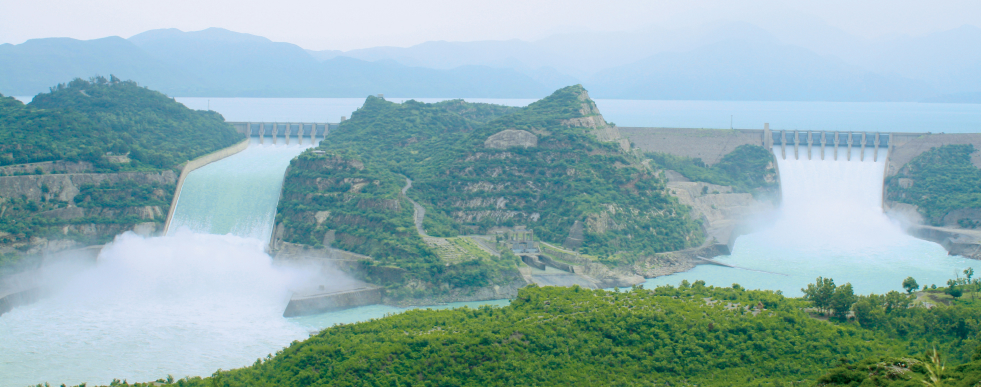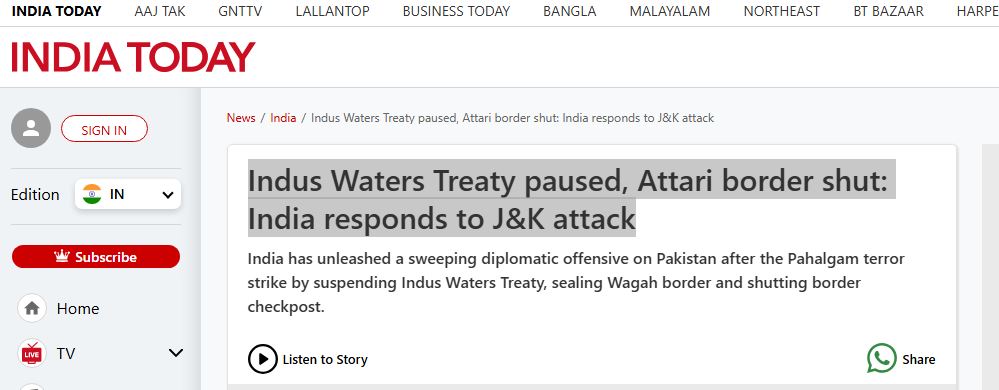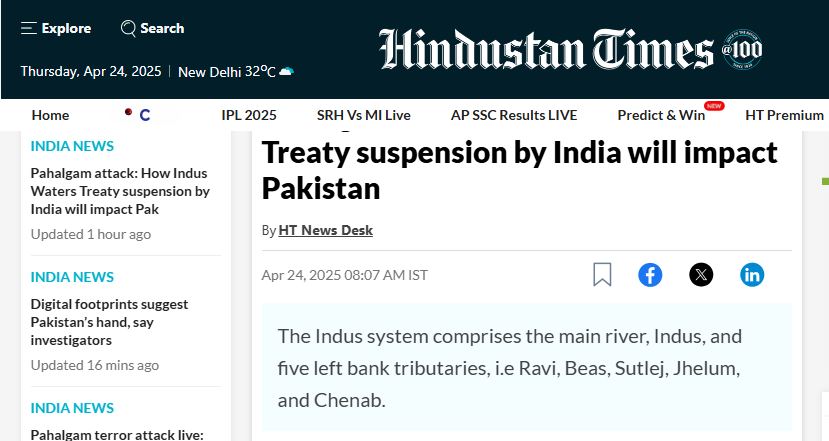India Using Water as a Weapon to Bully Pakistan, Escalate Aggression : Mushahid
New Delhi suspends with immediate effect a crucial river water treaty
- New Delhi suspends with immediate effect a crucial river water treaty
Islamabad: India’s unilateral revocation of the Indus Waters Treaty violates international law, as it’s a multilateral agreement involving Pakistan, India, and the World Bank from 1960, said Mushahid Hussain Syed while talking to media.
PM Modi’s government action reveals a preplanned intention, using the Pahalgam incident as a pretext, following his previous threats to end the treaty, he added.

India’s recent actions, including visa cancellations and treaty revocation, form a pattern of false flag operations and baseless allegations against Pakistan, he said.
Using water as a weapon to bully Pakistan is part of India’s escalating aggression, creating unnecessary, he noted.
The Indus Waters Treaty (IWT), a water-sharing agreement between India and Pakistan, was signed in 1960 with the World Bank as a mediator.
The Indus system comprises the main river, Indus, while five left bank tributaries, i.e Ravi, Beas, Sutlej, Jhelum, and Chenab.

This treaty divides the waters of six rivers in the Indus basin: India controls the eastern rivers (Ravi, Beas, Sutlej), while Pakistan controls the western rivers (Indus, Jhelum, Chenab). This treaty has been a cornerstone of cooperation between the two nations, even during periods of conflict.
The World Bank played a crucial role in facilitating negotiations and ultimately securing the treaty between the two nations, who have fought four wars since 1947.
on Wednesday (April 23), India decided to downgrade its ties with Pakistan a day after suspected militants killed 26 men at a tourist destination in Kashmir in the worst attack on civilians in the country in nearly two decades.
In a press conference, Indian Foreign Secretary Vikram Misri told that the cross-border linkages of the attack had been “brought out” at a special meeting of the security cabinet, after which it was decided to act against Pakistan.

Vikram Misri further said New Delhi would suspend with immediate effect a crucial river water treaty that allows for sharing the waters of the Indus river system between the two countries.
India’s suspension of the Indus Waters Treaty clearly betrays aggression and extremism, yet it is a fact that cannot be denied that New Delhi can neither unilaterally suspend nor cancel this treaty.
Experts say that the Indus Waters Treaty is a globally recognized and guaranteed treaty. If India unilaterally stops or cancels it, doubts about the validity of its other international treaties will surely arise. It must also be taken into account that the World Bank is a guarantor of this treaty.
Can India unilaterally terminate or suspend the Indus Waters Treaty? According to the treaty, India has no legal authority to do so. Article 12(4) of the treaty states that it can only be terminated if both India and Pakistan agree in writing, say the international experts.
In other words, any termination requires a jointly drafted agreement, which must then be ratified by both parties. There is no provision in the treaty allowing for unilateral suspension. It is intended to be of indefinite duration and is not tied to any specific time frame or event.
India and Pakistan are equally bound by the Indus Waters Treaty. Any attempt to withdraw from it unilaterally constitutes a breach of the treaty. If India ceases to comply with its terms under the pretense of “annulment,” “suspension,” “withdrawal,” or “cancellation,” it essentially means it has chosen to obstruct the flow of water to Pakistan. What India might label as a “withdrawal,” Pakistan — and likely the international community — would view as a violation.
Now what would happen if India blocked the downstream flow of water to Pakistan — and could this action set a precedent for upstream countries like China? Blocking the flow of Pakistani rivers would not only violate international water law but also set a dangerous precedent.
As per international law, an upstream country (like India) does not have the right to block water to a downstream country (like Pakistan), regardless of whether a treaty exists. Should India take such a step, it would create a new regional precedent that might be referenced in international legal forums. China, for instance, could justify blocking the Brahmaputra River’s flow into India by citing similar behavior.
Therefore, this move by India is not only dangerous for Pakistan but could also backfire on India itself, as global powers such as China are closely monitoring the situation.
The Indus Waters Treaty is a strong and lasting treaty and there is no clause in it that allows unilateral suspension or termination. Any modification can be done only through mutual consent and a ratified agreement.
To conclude it can be stated with facts that India’s unilateral action not only defies the mechanisms of the treaty — such as the Permanent Indus Commission, neutral expert consultation, or international arbitration — but it also goes against the very spirit of the agreement itself.
The treaty has survived wars and high political tensions in the past, which further fortifies its legal and moral basis, said Mushahid Hussain, geopolitical expert.







